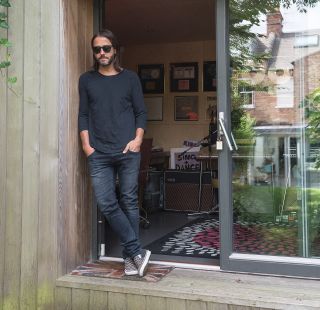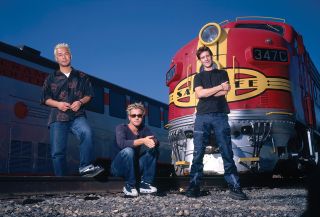Grant Nicholas remembers hanging around Camden during the height of Britpop. It was the mid-90s, and he and his band had bagged a deal a year or two earlier, just as the music industry descended en masse on N1. It was the era of Cool Britannia, and there was electricity in the air. But while the likes of Blur, Oasis and Elastica were being fêted by the mainstream music press, Feeder were on the outside with their faces pressed against the glass.
“We didn’t really fit in with all the trendy bands who were doing drugs in the toilets of The Good Mixer,” says Nicholas today of their cagoule- and Fred Perry-clad counterparts. “We were too – quote-unquote – ‘rock’. There were a few of us who knew each other and played together – us, Skunk Anansie, bands like that. We were outsiders.”
Nicholas has mixed feelings about how his band were perceived then and now. On the one hand, there’s a suspicion that Feeder having never been the cool kids still rankles. On the other, he’s justifiably proud of the band’s subsequent 20-year career, taking in nine Top 20 albums, thank you very much.
“I think we’ve proved ourselves to be a good band after all this time, don’t you?” he says with polite understatement, fixing Classic Rock with a dare-you-to-argue look. “Anyway, I stopped caring what other people thought years ago.”
On the first point, undeniably so. Nicholas himself is one of the great unsung British songwriters of recent years. His songs are carried aloft by the sort of melodic craftsmanship that can be described without embarrassment as ‘timeless’. Over the years, the Welshman has turned his hand to freewheeling alt.rock, billowing emotional anthems and, in the case of their biggest hit, Buck Rogers, solid gold pop.
We’re sitting in a shed-cum-home studio at the bottom of Nicholas’s North London garden. The walls are covered in Feeder memorabilia – gold and platinum discs and gig posters hang above various guitars, keyboards and mixing desks. Most poignant is an image of the cover of 2002’s Comfort In Sound, the album that helped lead the band out of the darkness following the suicide of original drummer Jon Lee.
Nicholas himself is an astonishingly well-preserved 49. He looks exactly the same as he did when Feeder released their debut mini-album, Swim, back in 1996. He’s a friendly, garrulous talker. “Oh, Grant can talk and talk,” says Taka Hirose, the band’s Japanese-born bassist. “When I first joined I couldn’t always understand what he was talking about.”
Nicholas can be prickly if he feels his band are being slighted, but there’s little of the whiff of the rock star about him. A couple of weeks after we talk, Feeder play an outdoor gig in front of a few thousand people at the racecourse in Nicholas’s home town of Chepstow, South Wales. “There was a petrol station over there,” he says at one point. “I used to work there. Bloody loved it.”
Dave Lee Roth he isn’t.
“I never got into this to be a ‘rock star’,” he says with a kind of earnest scorn, back in his shed. “I wanted to write good songs. If that makes me unusual, so what?”

For all his modesty, Nicholas has always been fiercely ambitious. He moved from Wales to London in his early 20s, drawn by what was happening in the capital’s music scene. As a kid, he loved Black Sabbath and The Police, but his musical influences were too heavy for the indie crowd and too poppy for its metal counterpart.
“So we created our own little scene,” he says. “[North London pub] The Water Rats was kind of our base. That’s where me and Jon started to get things off the ground.”
Nicholas had met the man who would become his musical partner in crime even before he moved to London. Jon Lee was born in Newport, just a few miles down the road from Chepstow. The drummer was the yin to Nicholas’s yang – a live‑wire presence who appointed himself the band’s cheerleader-in-chief.
“Jon was such a brilliant salesman,” says Nicholas. “He lived and breathed what we were doing. He’d be the one handing out flyers or shoving demos into people’s hands. I mean, me and Taka did our share of that, but he was the one who really pushed us.”
Even with Lee’s huge efforts, it took a while for the band to gain traction. Their early choice of names – going with both Reel and Real – probably didn’t help matters much. They changed it to Feeder after signing to independent label Echo in 1995, though in all honesty that wasn’t much of an improvement. (Nicholas looks aggrieved at the suggestion.)
Still, their music made up for their uninspired choice of name. Swim and its full-length follow-up Polythene offered a streamlined, distinctly British take on the brittle alt.rock of such big-hitters as Pixies and Smashing Pumpkins. Songs such as Crash and the blissful High sugar-coated their alt.rock stylings with Nicholas’s unabashed pop sensibilities. Meanwhile, the trio’s decision to start wearing orange jumpsuits – combined with Hirose’s unique deely-bopper hairstyle – gave them nothing if not a distinctive look.
“Oh God, the jumpsuits,” says Nicholas, wincing. “I have no idea what we were thinking. I suppose someone suggested it might have helped if we had an image, so that’s what we decided. I still haven’t got a royalty cheque from Slipknot for the idea,” he adds wryly.
Despite – or maybe because of – the jumpsuits, Feeder stood apart from the Britpop crowd. The rock media’s attempts to create a parallel scene made up of heavier bands – imaginatively dubbed Britrock – was more successful. Today, Nicholas says he was never entirely comfortable with the notion of being pigeonholed, but admits that it helped raise the profile of his band. Certainly Feeder, along with the likes of Terrorvision and Skunk Anansie, benefited from the exposure.
But Nicholas was keen to move forward, not rest on what his band had achieved far. Second album Yesterday Went Too Soon smoothed out some of the band’s more abrasive edges, while their third, Echo Park, wore its pop influences proudly on its sleeve – not least on the hit single Buck Rogers.
With its epic chorus, nagging hook and nursery rhyme lyric (‘He’s got a brand new car, looks like a Jaguar’), Buck Rogers was genius in its simplicity. Nicholas laughs when he recalls writing it – it was inspired when he and his then-girlfriend decided to take a break from each other and she briefly dated “a guy who literally drove a Jaguar”. (The story has a happy ending: Nicholas and his girlfriend reunited and eventually married, and they’re still together today.)
Less down-to-earth musicians might be embarrassed by the song. Nicholas has no such qualms. “What can I say? It’s a great song. And it supported us financially for a long time.”
Buck Rogers elevated Feeder to rock’s A-list. After almost a decade of struggle, they found themselves playing to a whole new audience, one who wouldn’t have dreamed of buying a record like Polythene or going to see a band who wore orange jumpsuits on stage. Life couldn’t have been better for Feeder. And then Jon Lee killed himself.

Grant Nicholas and Taka Hirose both have the same memory of the last time they saw their bandmate. It was shortly before Christmas 2001. Feeder had just recorded an appearance on Saturday morning kids’ TV show SM:TV, and the three of them said their goodbyes before the drummer flew back to his new home in Miami for a few weeks’ break. Both remember him riding off on a bike with Christmas presents piled up behind him.
“He seemed happy, giving everyone hugs,” says Nicholas. “Nothing untoward. Certainly nothing to suggest what was going to happen.”
On January 7, Nicholas got a call on his mobile from an unidentified number. He ignored it, not realising it was Lee. The same day, the drummer hanged himself in his garage. Today Nicholas talks about his friend’s death with the kind of matter-of-factness that comes with having spent a decade and a half processing what happened.
“I miss him greatly, of course I do,” he says. “I beat myself up over missing that phone call. You think: ‘Could I have stopped him? Did he want someone to help him?’ But I didn’t, and he did what he did. I can’t change that.”
Nicholas admits he lost himself in the months that followed. “My head was here,” he says, making a spinning-off-into-space motion with his hand.
Ever the craftsman, music provided his anchor. He continued writing songs, even if he didn’t know what they were for. “I didn’t even know if Feeder still existed,” he says.
Hirose was struggling to deal with what had happened, but he remembers Nicholas playing him the new songs. “They were Feeder songs,” says the bassist, shrugging. “That’s when we realised that we weren’t going to split up.”
“I always like to think that Jon would have wanted us to carry on,” says Nicholas. “Feeder was everything to him.”
The album that followed Lee’s death, Comfort In Sound, was an audible healing process. It was, understandably, quieter and more reflective than anything they’d made before, while the cover featured an illustration of a figure with angel wings. “It was hard to make in a lot of ways, but in others it was really easy,” says Nicholas. “It’s a cliché to say it was cathartic, but that’s exactly what it was.”
Comfort In Sound gave Feeder their second consecutive Top 10 album, though its success was bittersweet. Its more measured approach inadvertently pointed the way forward for the band, musically at least. Feeder’s next two albums, 2005’s Pushing The Senses and 2008’s Silent Cry, smoothed out what remained of their rougher edges. Where they’d once sounded like a British Smashing Pumpkins, now it seemed they were going for the middle-of-the-road Coldplay vote.
“Well, that’s frankly ridiculous,” says Nicholas, bristling for the first time. “Listen to those records – yes, they’ve got softer songs on them, but they still sound like Feeder. When you get to that stage of your career and people are accusing you of selling out, well… you can’t do anything but laugh.”
It’s an accusation that some people still level at the band. One recent post on Feeder’s Facebook page accused the band of “turning into Coldplay… Lost the rock to the Bedwhetters [sic]”, prompting a typically polite response from Nicholas, albeit one that clearly came delivered through gritted teeth: “I don’t think so, mate.”
“I think I’d had a glass or two of red too many,” he says, laughing. “I mean, I’m not the sort of person who’d go round to someone’s house and chin them for saying something like that.” He pauses. “But it does piss me off.”

These days, Feeder exist in a comfortable place. They still have commercial clout – their most recent release, a Best Of that came with brand new nine-track album Arrow bolted onto it, entered the UK Top 10 (to allay the fears of those who still see Feeder as “bedwhetters”, the new tracks are as muscular as anything the band wrote in the 90s). Still, the approval that most bands seek eludes them. “I didn’t get into this to please the critics,” says Nicholas with a shrug.
In fact he seems more put out that this year is being billed as Feeder’s 21st anniversary. “It’s not. It’s twenty-five years,” he says exasperatedly.
The crowd that has gathered at Chepstow Racecourse don’t seem to care about either anniversaries or critical acclaim. They’re a mix of local rock fans celebrating their home-town heroes and casual music fans who could sing along to the hits but couldn’t name an album track. “It’s only taken us twenty-five years to get here,” Nicholas says from the stage at one point.
Earlier, in his garden shed, he looks back on that quarter-century journey with a mix of pride and sadness. “This is where you ask if it’s been worth it, right?” he says. “Well, no and yes. I wish Jon was still here, and I miss him every day. But just to have made it this far… Well, that’s got to be worth something, right?”
Feeder – The Best Of 21st Anniversary Collection is out now via BMG. The band play UK dates in March.
The 10 songs that inspired Feeder, by Grant Nicholas


